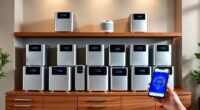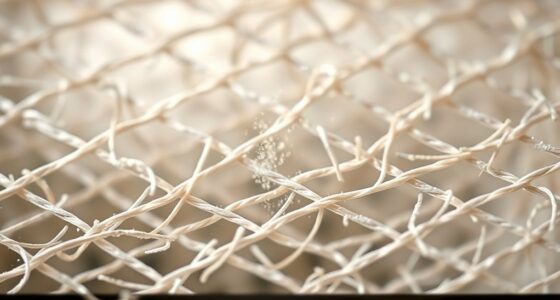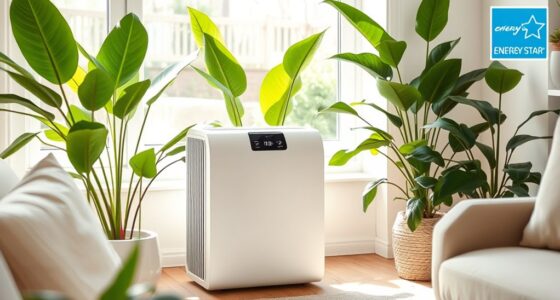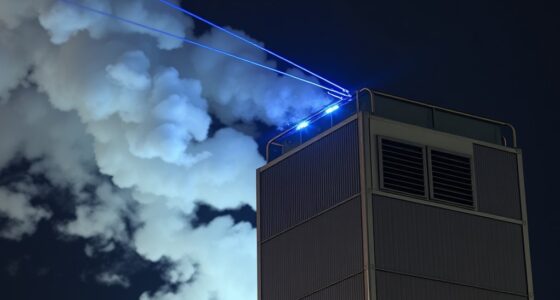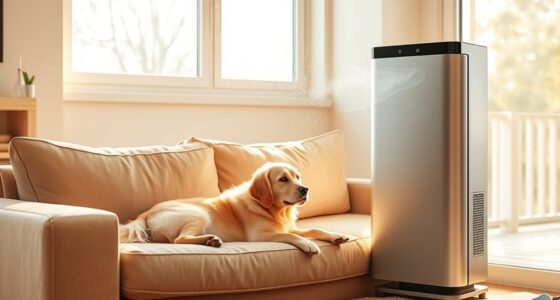Air purifiers target specific areas and use advanced filters like HEPA to trap tiny particles, making them great for allergy relief or focused cleaning. HVAC filters are integrated into your home’s heating and cooling system, providing continuous whole-house filtration based on ratings like MERV. Both improve air quality, but they serve different needs and operate differently. If you want to understand which option suits your space best, there’s more to explore below.
Key Takeaways
- Air purifiers target specific rooms with high-efficiency filters like HEPA, while HVAC filters are integrated into the central system for whole-house coverage.
- HEPA filters in purifiers trap tiny particles (0.3 microns) with 99.97% efficiency, whereas HVAC filters use MERV ratings to capture larger particles across a broader area.
- Some air purifiers produce ozone, which can be harmful, whereas HVAC filters do not generate ozone during operation.
- Air purifiers are ideal for targeted, portable air cleaning, while HVAC filters provide continuous filtration as part of the home’s central heating and cooling system.
- Regular maintenance, including filter replacements, is essential for both systems to ensure optimal air quality and performance.
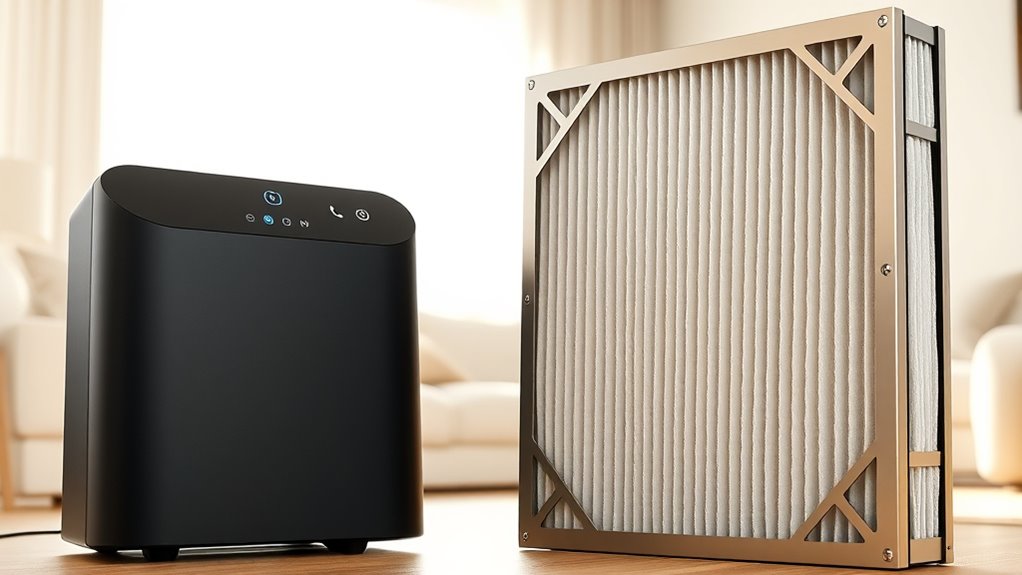
When it comes to improving indoor air quality, many people wonder whether air purifiers or HVAC filters are the better choice. Both options can help reduce airborne pollutants, but they work differently and serve distinct purposes. If you’re considering an air purifier, you’ll want to look for models with HEPA filtration, which is highly effective at capturing tiny particles like dust, pollen, pet dander, and even some bacteria and viruses. HEPA filters can trap particles as small as 0.3 microns with 99.97% efficiency, making them a strong choice for allergy sufferers or anyone concerned about airborne contaminants. However, it’s important to be aware of ozone concerns. Some air purifiers, especially those that use ionization or ozone generators, produce ozone as a byproduct. Ozone can irritate your lungs and worsen respiratory issues, so if you choose an air purifier, verify that it’s ozone-free or has low ozone emissions.
On the other hand, HVAC filters are integrated into your home’s existing heating and cooling system. They are typically rated by MERV (Minimum Efficiency Reporting Value), which indicates how well they can capture particles. Higher MERV ratings, like MERV 13 or above, can effectively trap finer particles, including some bacteria and smoke. HVAC filters are convenient because they work continuously as your system runs, helping to keep the air cleaner throughout the day. However, they are generally less effective at removing gases, odors, or volatile organic compounds unless combined with specialized filters. Additionally, regular replacement of HVAC filters is essential to maintain airflow and filtration efficiency.
While both options improve air quality, they aren’t interchangeable. An air purifier with HEPA filtration offers targeted, high-efficiency removal of airborne particles in a specific room or area. HVAC filters, meanwhile, serve as a whole-house solution, constantly filtering the air as part of your central system. If you’re particularly sensitive to allergens or want a portable solution for a specific space, an air purifier might be better. For ongoing, whole-house filtration, upgrading your HVAC filter is a practical choice. Just remember, if you opt for an air purifier, avoid models that produce ozone, as that could worsen respiratory health. Additionally, understanding cloud service vulnerabilities can help you develop better contingency plans for your home systems. Together, these systems can complement each other, ensuring cleaner air throughout your home with minimal ozone concerns.
Frequently Asked Questions
Can Air Purifiers Eliminate All Airborne Viruses?
You ask if air purifiers can eliminate all airborne viruses. While they substantially boost viral mitigation, they can’t guarantee complete removal due to limits in air filtration efficiency. Air purifiers with HEPA filters capture most small particles, including viruses, but there’s always a chance some may escape. For the best protection, combine air purifiers with good ventilation and regular cleaning, understanding that no device offers absolute virus elimination.
How Often Should I Replace HVAC Filters?
You might think replacing your HVAC filters isn’t urgent, but proper filter maintenance is vital for indoor air quality. Generally, you should replace filters every 1 to 3 months, depending on usage, filter type, and household factors like pets or allergies. Sticking to a consistent replacement schedule ensures your system runs efficiently, prevents buildup, and keeps your air clean. Don’t ignore it—regular filter maintenance makes a big difference.
Do Air Purifiers Reduce Outdoor Pollution Indoors?
Air purifiers can help reduce outdoor pollutants that enter your home, improving indoor air quality. They actively filter airborne particles like pollen, dust, and smoke, making the air cleaner and healthier. While they aren’t a complete solution for outdoor pollution, using an air purifier alongside proper ventilation can considerably improve indoor air quality by limiting the impact of outdoor pollutants inside your space.
Are HEPA Filters Compatible With All HVAC Systems?
You might wonder if HEPA filters are compatible with your HVAC system. Filter compatibility varies, so check your system’s specifications before HEPA installation. Some HVAC units can handle HEPA filters, but others may require modifications for proper airflow. Always verify with your system’s manufacturer or a professional to confirm the filter fits correctly and maintains efficiency, preventing damage and maximizing air quality.
Which Option Is More Energy-Efficient for Long-Term Use?
Imagine saving money while breathing easier—sounds perfect, right? When choosing, you’ll find HVAC filters often win in energy efficiency for long-term use, thanks to lower energy consumption and minimal maintenance costs. Air purifiers might be flashy, but they tend to sip power and require frequent replacements. So, if you’re looking for a budget-friendly, eco-conscious choice, HVAC filters usually lead in the race for efficiency.
Conclusion
So, now that you know the difference between air purifiers and HVAC filters, which one will you choose to keep your home healthier? Both have their benefits, but understanding their roles helps you make the best decision for your space. Don’t you deserve to breathe cleaner, safer air every day? Take action today and choose the option that best fits your needs—because your health and comfort are worth it.

